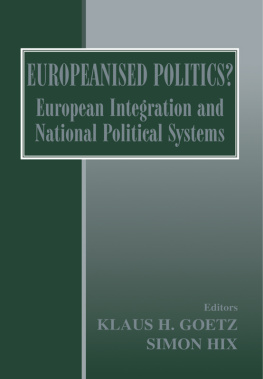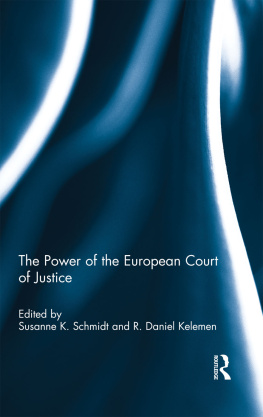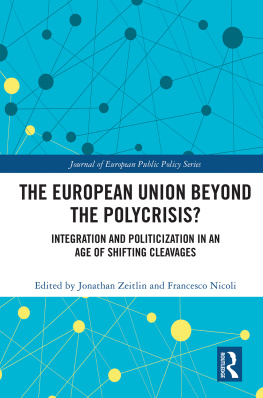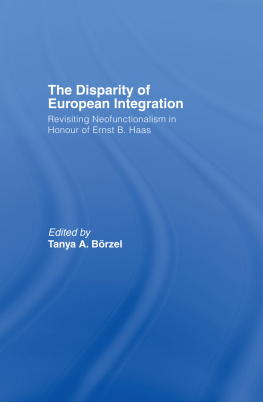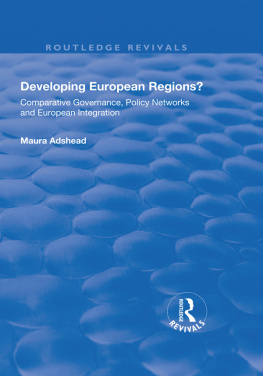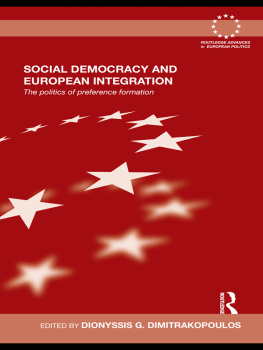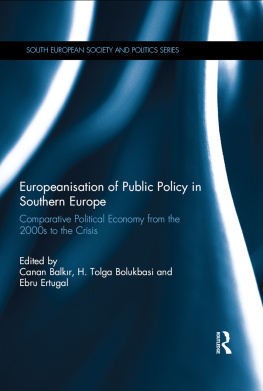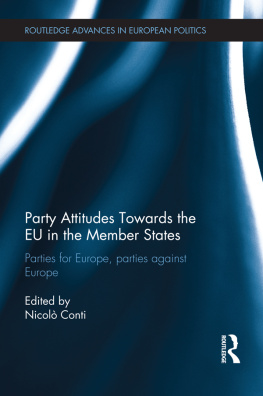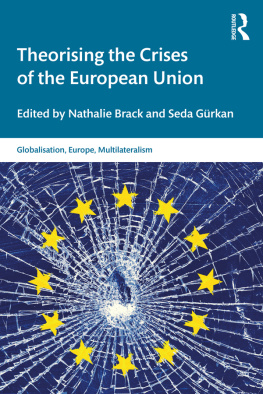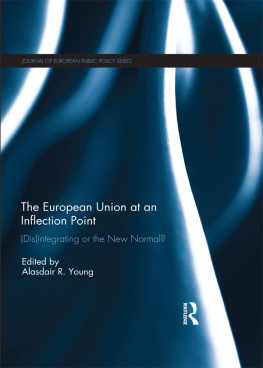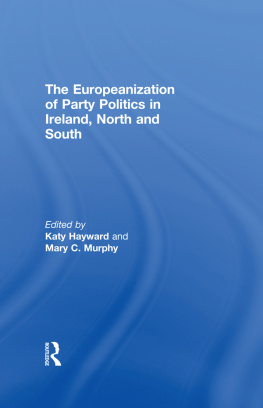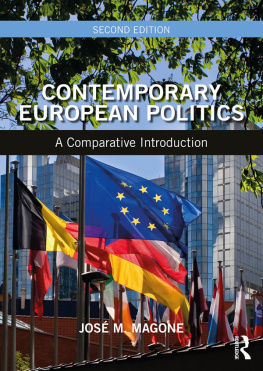EUROPEANISED POLITICS?
BOOKS OF RELATED INTEREST
Recasting European Welfare States
edited by Maurizio Ferrera and Martin Rhodes
The Changing French Political System
edited by Robert Elgie
Compounded Representation in West European Federations
edited by Joanne B. Brzinski, Thomas D. Lancaster and Christian Tuschhoff
Politics and Policy in Democratic Spain: No Longer Different?
edited by Paul Hey wood
Britain in the Nineties: The Politics of Paradox
edited by Hugh Berrington
Crisis and Transition in Italian Politics
edited by Martin Bull and Martin Rhodes
Southern European Welfare States: Between Crisis and Reform
edited by Martin Rhodes
The Euro-Mediterranean Partnership: Political and Economic Perspectives
edited by Richard Gillespie
The State in Western Europe: Retreat or Redefinition?
edited by Wolfgang C. Mtiller and Vincent Wright
The Regions and the European Community
edited by Robert Leonardi
The Regional Dimension of the European Union
edited by Charlie Jeffery
National Parliaments and the European Union
edited by Philip Norton (new in paperback)
The Crisis of Representation in Europe
edited by Jack Hayward
The Politics of Immigration in Western Europe
edited by Martin Baldwin-Edwards and Martin A. Schain
First Published in 2001 in Great Britain by
FRANK CASS PUBLISHERS
2 Park Square, Milton Park, Abingdon, Oxon, OX14 4RN
and in the United States of America by
FRANK CASS PUBLISHERS
270 Madison Ave,
New York NY 10016
Transferred to Digital Printing 2005
Website: www.frankcass.com
Copyright 2001 Frank Cass Publishers
British Library Cataloguing in Publication Data
Europeanised politics?: European integration and national
political systems
1. European Union 2. European Union countries -Politicsand government
I. Goetz, Klaus H. II. Hix, Simon
320.94
ISBN 0 7146 5141 9 (hb)
ISBN 0 7146 8166 0 (pb)
Library of Congress Cataloging-in-Publication Data
Europeanised politics? : European integration and national political systems / editors, Klaus H. Goetz, Simon Hix.
p. cm.
Based on two workshops held at Nuffield College in Oxford in 1999.
Includes index.
ISBN 0-7146-5141-9 (hardbound) - ISBN 0-7146-8166-0 (pbk.)
1. European Union. 2. European Union countries - Politics and government. I. Goetz, Klaus H., 1961- II. Hix, Simon.
JN30 .E9424 2000
341.2422-dc21
00-046592
This group of studies first appeared in a Special Issue of West European Politics (ISSN 0140-2382) Vol.23, No.4 [Europeanised Politics? European Integration and National Political Systems]
All rights reserved. No part of this publication may be reproduced, stored in or introduced into a retrieval system, or transmitted, in any form, or by any means, electronic, mechanical, photocopying, recording, or otherwise, without the prior written permission of the publisher of this book.
Contents
Simon Hix and
Klaus H. Goetz |
Peter Mair |
Matthew Gabel |
Doug Imig
and Sidney Tarrow |
Gerda Falkner |
Holli A. Semetko,
Claes H. de Vreese and
Jochen Peter |
Tapio Raunio
and Simon Hix |
Damian Chalmers |
Klaus H. Goetz |
Preface
The papers collected in this volume arise out of two workshops, held at Nuffield College Oxford. We would like to thank the Warden and Fellows of Nuffield for allowing us use of the Colleges splendid facilities. The workshops were sponsored by the London Office of the Friedrich Ebert Foundation and the Suntory and Toyota International Centres for Economics and Related Disciplines (STICERD) at the LSE. Without their generous assistance, this volume could not have been published. The second workshop benefited greatly from the comments of the discussants of the papers, and we would like to thank Geoff Evans, David Farrell, Hussein Kassim, Anand Menon, Roger Scully, Alec Stone Sweet and Paul Taggart for their perceptive remarks. Special thanks are due to Stephanie Wright of Nuffield College, who did most of the work involved in organising and running the workshops and, importantly, made sure that bills were paid promptly.
Like so many other collaborative efforts in comparative European politics, this project was inspired by the late Vincent Wright. He provided the initial impetus, opened his College to us, chaired the first workshop and was to take part in the second, but had already become too ill to attend. He was a wonderful man, and we would like to dedicate this volume to his memory.
Klaus H. Goetz
Simon Hix
Introduction: European Integration and National Political Systems
SIMON HIX and KLAUS H. GOETZ
EUROPEAN INTEGRATION AND DOMESTIC POLITICAL CHANGE
The process of European integration has been studied and analysed at great length in a variety of academic disciplines. The main focus of this endeavour is usually to try to explain institution-building, policy integration or policy outputs at the European level. In the main theories of integration, domestic politics is a central explanatory factor of the integration process. For example, in the early neo-functionalist theory of Ernst Haas and his followers, one of the driving forces of the delegation of policy functions to the European level was the battle between domestic interest groups, political parties and rival groups of elites. In the contemporary liberal-intergovernmental approach of Andrew Moravcsik, the integration process is driven by competition and bargaining between the European nation-states, but national preferences emerge from the on-going processes of domestic politics, where rival interests compete for control of the policy agenda.
Much less effort has gone into thinking about the reverse effect: European integration as an explanatory factor in domestic political continuity or change. The study of national political systems has evolved largely in isolation from the study of European integration for three main reasons. First, the separation has been a natural product of a division of labour in the discipline of political science: between comparative politics, with its focus on domestic political institutions and processes, and international relations, with its focus on international regimes and regional integration. Second, many scholars of comparative European politics have taken a healthily sceptical attitude to the study of European integration as either a normative project or as not contributing much to generalisable political science knowledge. Third, as long as the empirical impact of European integration on national polities and politics was seemingly small, it could be ignored as a relevant variable. In other words, either the study of European integration was someone elses job, or it was not very interesting, or it was largely irrelevant.
This position is no longer sustainable. With the growing development of the multi-level European polity, the disciplinary boundary between comparative politics and international relations is increasingly porous.1 With the growing sophistication of the study of European integration and the EU, by understanding developments at the European level we can now begin to think about how this might help explain changes in domestic political systems. Finally, with the establishment of the Single Market and Economic and Monetary Union and the delegation of competences to the European level in many areas of domestic politics, the impact of European-level decisions on the choices available in national political systems is now too evident to ignore.

